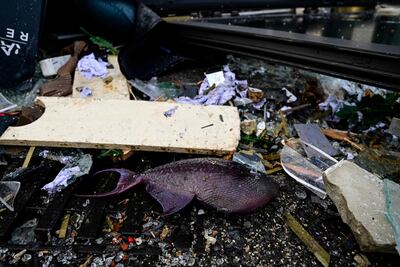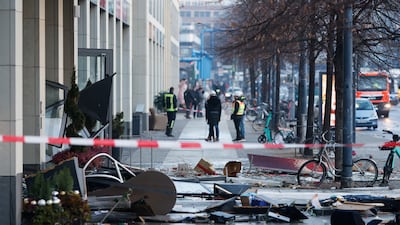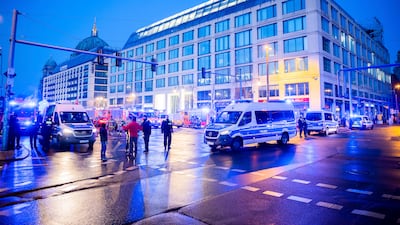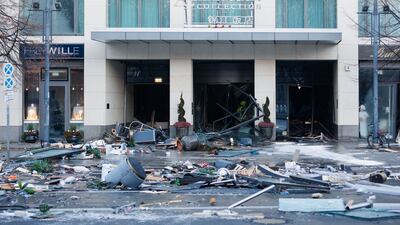One of the world’s largest freestanding aquariums, home to 1,500 exotic fish, burst in Berlin on Friday, causing a wave of devastation around the attraction.
When it broke, glass, water and hundreds of tropical fish gushed out on to the street.
The tank contained about 80 species of fish and held about a million litres of water.
"It was a full-on tsunami," said Berlin mayor Franziska Giffey, adding that it was pure luck the incident had happened in the early morning when very few people were around.
"Despite the terrible destruction we're seeing, we're lucky people weren't seriously injured," she told reporters.
The 1,500 fish in the tank, however, "could not be saved", Ms Giffey added.
Sandra Weeser, a German politician who was staying at the hotel at the time of the incident, told Reuters the scene was "just chaos".
"The whole aquarium burst and what’s left is total devastation. Lots of dead fish, debris."
Among the fish it housed were blue tang and clownfish, the species known from the popular animated film Finding Nemo.

About 100 emergency responders were sent to the AquaDom complex, which houses a Radisson hotel, a museum, shops and restaurants, shortly before 6am.
"It felt like an earthquake" said Naz Masraff, who had been staying at the hotel.
Ms Weeser said she was woken up by "a kind of shockwave".
"There was a slight tremor of the building and my first guess was an earthquake," she told the Berliner Morgenpost newspaper.
The area where the aquarium once stood was now "dark and wet" she said, recalling how she saw "one of those large parrotfish lying on the ground, frozen".
“We have not yet been able to walk the first floor completely, which is probably where these fish will be,” fire service spokesman Adrian Wentzel said.
“But the thing is that the water has completely leaked out and the fish that were in this aquarium could not be saved either.”
Pictures and videos circulating online early on Friday, apparently from guests staying at the hotel, showed extensive damage to the aquarium with only the frame still standing. Debris was strewn all around.
The tank appeared to have drained completely.
Efforts were under way on Friday to save an additional 400 to 500 smaller fish housed in aquariums underneath the hotel lobby.
Without electricity, their tanks were not receiving the necessary oxygen for them to survive, officials said.
“Now it’s about evacuating them quickly,” Almut Neumann, a city official in charge of environmental issues for Berlin’s Mitte district, told German news agency dpa.
Various organisations, including the Berlin Zoo, offered to take in the surviving fish.
About 350 hotel guests were asked to pack their belongings and leave the building, the fire brigade representative said.
The incident resulted in serious damage and minor injuries, police said.
"In addition to the unbelievable maritime damage ... two people were injured by glass splinters," Berlin police said on Twitter.
Search-and-rescue dogs scoured the ground floor of the building, which was too littered with debris for responders to gain access, but found no casualties, the Berlin fire brigade said on Twitter.
The cylindrical AquaDom, located in the foyer of the hotel, was a popular tourist attraction in the German capital.
It was the world's largest freestanding cylindrical aquarium at 16m tall, according to the Sea Life website, and had a clear-walled lift built inside to be used by visitors to the Sea Life leisure complex.
There was speculation that freezing temperatures of down to minus 10ºC overnight had caused a crack in the tank, which then exploded under the weight of the water.

Police spokesman Martin Stralau said the cause of the incident was still being investigated.
Witness Gwendolin Szyszkowitz told German news channel n-tv that she heard a loud bang and initially feared that a bomb had exploded.
Emergency services shut a major road next to the complex that leads from Alexanderplatz towards Brandenburg Gate in Berlin due to the large volume of water, glass and other debris that flooded out of the building.
Police urged drivers to avoid the area because water was leaking from the aquarium.
The road and sidewalks outside the complex were littered with debris.
Buses were sent to the complex to provide shelter for hotel guests leaving the building, police said on Twitter, as the temperature in Berlin hovered around minus 10ºC.
The aquarium opened in 2004 and was last refurbished in 2020, according to the complex's website.
During the upgrading work, all the water was drained from the tank and the fish were moved to aquariums in the basement of the building, where there is a breeding care facility for the fish, it said.
Aquarium operator Sea Life said it was saddened by the incident and was trying to get more information about the incident from the owners of the AquaDom.
Sea Life’s own aquarium is in the same building and visitors can tour it and the AquaDom on a single ticket.







